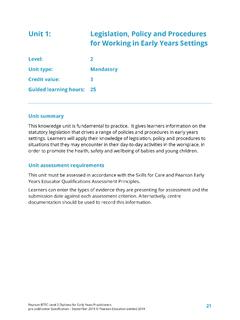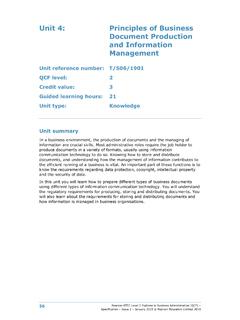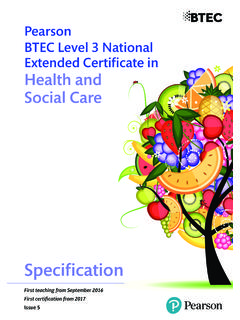Transcription of Unit 6: Assessment and Planning with Children and Young ...
1 unit 6: Assessment and Planning with Children and Young People in Residential Childcare unit reference number: A/506/7828. QCF level: 3. Credit value: 3. Guided learning hours: 20. unit summary In this unit , you will gain the knowledge, understanding and competence in order to make effective contributions to the Assessment and Planning for the lives of Children and Young people in residential childcare. This includes the purpose and principles of Assessment and Planning , the reasons why a child centred model of Assessment and Planning is used and the legal requirements for recording Assessment and Planning information. You will be able to participate in Assessment and Planning for Children and Young people, working with them as a plan is implemented and to review and update plans. Finally, you will contribute to Assessment led by other professionals. Additional information All the Assessment in this unit should be undertaken in relation to the stage of development and level of understanding of the child or Young person concerned.
2 Others Children and Young people Families/carers Foster carers Residential workers Social workers Psychologists Doctors Support workers Police Youth justice Speech and language therapists Other agencies Pearson BTEC Level 3 Diploma for Residential Childcare (England) (QCF) 73. Specification Issue 1 May 2015 Pearson Education Limited 2015. Methods of engagement Appropriate venue/location Contributions through play Contributions through pictures Children and Young people setting ground rules Written contributions Video/audio contributions 74 Pearson BTEC Level 3 Diploma for Residential Childcare (England) (QCF) . Specification Issue 1 May 2015 Pearson Education Limited 2015. Learning outcomes and Assessment criteria To pass this unit , the learner needs to demonstrate that they can meet all the learning outcomes for the unit . The Assessment criteria outline the requirements the learner is expected to meet to achieve the unit . Learning outcomes Assessment criteria 1 Understand the purpose and Describe the purpose of Assessment principles of Assessment and and Planning with Children and Planning with Children and Young Young people in residential people childcare Explain why a child centred model of Assessment and Planning is used Explain how Assessment frameworks help to ensure holistic Assessment Explain the legal requirements for recording Assessment and Planning information 2 Understand how to place Children Explain how to use a child centred and Young people at the centre of model of Assessment and Planning Assessment and Planning to identify the needs of Children and Young people Explain the importance of working with others when assessing and Planning for the needs of Children and Young people Describe how to use methods of engagement to ensure the child is central when assessing and Planning with Children and Young people Describe strategies for child centred Assessment and
3 Planning with Children and Young people who disengage from the process Pearson BTEC Level 3 Diploma for Residential Childcare (England) (QCF) 75. Specification Issue 1 May 2015 Pearson Education Limited 2015. Learning outcomes Assessment criteria 3 Be able to participate in Explain the boundaries of own role Assessment and Planning for and responsibilities within Children and Young people Assessment and Planning Engage with Children or Young people to enable them to express their needs, views and aspirations in the Assessment and Planning process Use and adapt Assessment frameworks to ensure the Assessment is full, accurate and child centred Work with the child or Young person to agree goals and targets Explain how the goals and targets identified will support the achievement of positive outcomes Work with the child or Young person and others to develop a plan to meet assessed needs and work towards positive outcomes Confirm that the child or Young person and others understand and agree to plan 4 Be able to work with Children and Support the child or Young person Young people as a plan is and others to understand their implemented roles and responsibilities in implementing an agreed plan Encourage the child or Young person to work towards the achievement of a plan Agree ways of recording progress towards goals and targets with the child or Young person and in line with organisational requirements Record progress of a child or Young person in relation to a plan 76 Pearson BTEC Level 3 Diploma for Residential Childcare (England) (QCF).
4 Specification Issue 1 May 2015 Pearson Education Limited 2015. Learning outcomes Assessment criteria 5 Be able to work with Children and Explain the importance of reviewing Young people to review and update and updating plans plans Work with the child or Young person and others to review progress towards goals and targets Identify aspects of the plan that are working well and those that need to be revised Use outcomes of review to update plan Agree the updated plan with the child or Young person and others involved 6 Be able to contribute to Assessment Explain own role and the roles of led by other professionals others in the external Assessment process Respond to requests for information to support the Assessment in line with organisational requirements Support the child or Young person to understand and contribute to external Assessment Pearson BTEC Level 3 Diploma for Residential Childcare (England) (QCF) 77. Specification Issue 1 May 2015 Pearson Education Limited 2015.
5 unit amplification 1 Understand the purpose and principles of Assessment and Planning with Children and Young people The purpose of Assessment and Planning with Children and Young people in residential childcare: engagement; identification and agreement of goals, needs, preferences, choice; child/person-centred; their experience/view; needs;. evaluation; review Why a child centred model of Assessment and Planning is used: addresses real needs; takes into account individual age and stage of development; likes and dislikes; individual targets and goals; ensures all targets and goals are appropriate and fair; Children are more interested in activities and experiences that are designed to be relevant to them specifically and therefore participate and learn more effectively How Assessment frameworks help to ensure holistic Assessment : to plan provision may involve working with Children and Young people, families and carers, team members and other professionals within and beyond the organisation.
6 Identified needs may relate to: health and well-being;. relationships; learning; leisure; play The legal requirements for recording Assessment and Planning information: the Data Protection Act 1998; Common Law Duty of Confidentiality; Health and Social Care Act 2012; the Human Rights Act 1998; Codes of practice relevant to sector; policies/procedures of work setting 2 Understand how to place Children and Young people at the centre of Assessment and Planning How to use a child centred model of Assessment and Planning to identify the needs of Children and Young people: holistic Assessment ; involvement of child/ Young person and family; importance of identifying strengths and needs;. taking into account preferences and family circumstances; advocacy; identifying services to support effectively The importance of working with others when assessing and Planning for the needs of Children and Young people: Children and Young people;. families/carers; foster carers; residential workers; social workers.
7 Psychologists; doctors; support workers; police; youth justice; speech and language therapists; other agencies How to use methods of engagement to ensure the child is central when assessing and Planning with Children and Young people: appropriate venue/location; contributions through play; contributions through pictures;. Children and Young people setting ground rules; written contributions;. video/audio contributions Strategies for child centred Assessment and Planning with Children and Young people who disengage from the process: appropriate venue/location;. contributions through play; Children and Young people involved in setting ground rules; written contributions; contributions through pictures; individual learning styles; likes and dislikes; particular interests; activities and experiences are well planned, engaging and build on previous experience 78 Pearson BTEC Level 3 Diploma for Residential Childcare (England) (QCF) . Specification Issue 1 May 2015 Pearson Education Limited 2015.
8 Information for tutors Suggested resources Books Brown S Play: How It Shapes the Brain, Opens the Imagination, and Invigorates the Soul Reprint edition (J P Tarcher/Penguin Putnam, 2010) ISBN 9781583333785. Else P The Value of Play (Continuum International Publishing Group Ltd., 2009). ISBN 9780826495655. Lindon J Understanding Child Development: 0-8 Years (Hodder Education, 2012). ISBN 9781444167184. Meggitt C Child Development an Illustrated Guide, 3rd edition with DVD. (Pearson Education, 2012) ISBN 9780435078805. Minett P Child Care and Development 6th Edition (Hodder Education, 2010). ISBN 9781444117134. Trodd L Transitions in the Early Years: Working with Children and Families (SAGE Publications Ltd, 2012) ISBN 9781446249789. Websites the website of the national charity 4 Children provides a library of resources, including publications, case studies and videos the Barnardo's website provides a wide variety of information, including research and publications on a variety of topics Early Education, The British Association for Early Childhood Education offers support to all early childhood education practitioners and various publications can be found on their website the government services and information website where information relating to childcare can be found the website of KIDS, which is a leading disabled Children 's charity, provides a variety of learning and resources, some which require purchase the website of the National Children 's Bureau, where a variety of resources can be found, including downloadable resources the website of the NSPCC provides a variety of research and resources.
9 Including resources on the topic of residential childcare Other Nursery World Play Right Pearson BTEC Level 3 Diploma for Residential Childcare (England) (QCF) 79. Specification Issue 1 May 2015 Pearson Education Limited 2015. Assessment This unit is internally assessed. To pass this unit the evidence that the learner presents for Assessment must demonstrate that they have met the required standard specified in the learning outcomes and Assessment criteria and the requirements of the Assessment strategy. To ensure that the Assessment tasks and activities enable learners to produce valid, sufficient, authentic and appropriate evidence that meet the Assessment criteria, centres should apply the unit Assessment guidance provided and the requirements of the Assessment strategy given below. Wherever possible, centres should adopt an holistic approach to assessing the units in the qualification. This gives the Assessment process greater rigour and minimises repetition, time and the burden of Assessment on all parties involved in the process.
10 unit Assessment requirements This unit needs to be assessed in line with the Skills for Care & Development QCF. Assessment Principles, in Annexe A. unit Assessment guidance This guidance supports assessors in making decisions about how best to assess each unit and the evidence needed to meet the requirements. Centres can adapt the guidance as appropriate for learners and the particular Assessment context. For learning outcome 1, learners will need to demonstrate an understanding of the principles of Assessment and Planning when applied in residential childcare. A professional discussion or reflective account could be used to provide the evidence for learning outcome 1 ACs and where the learners will need to describe why Assessment and Planning are so important in the delivery of appropriate services and the value of a child centred model of Assessment . The discussion or account could be extended to include the vital role Assessment frameworks play and how the outcomes of assessments should be recorded and stored, following legal conditions, covering learning outcome 1 ACs and For learning outcome 2, the learners will need to demonstrate an understanding of how to place Children and Young people at the centre of Assessment and Planning .










